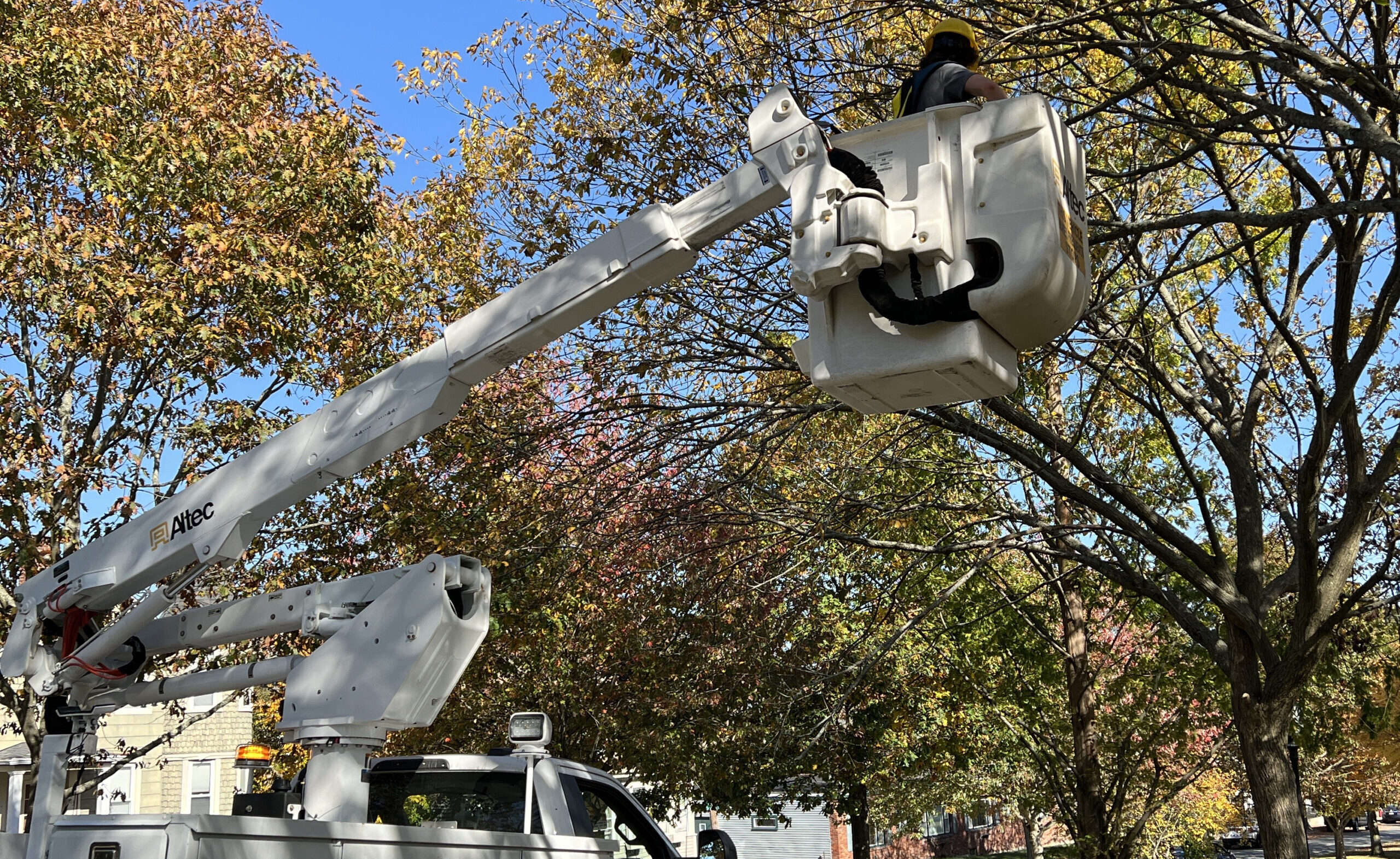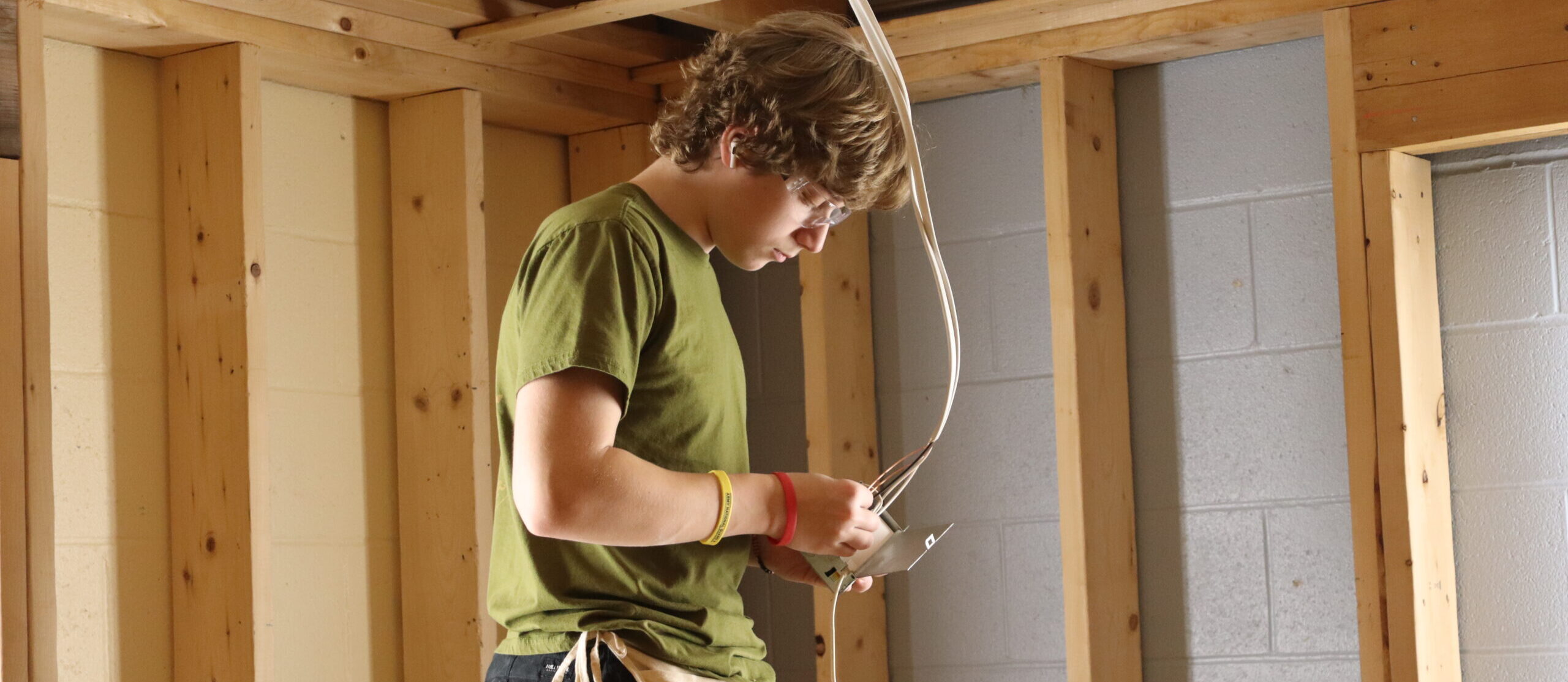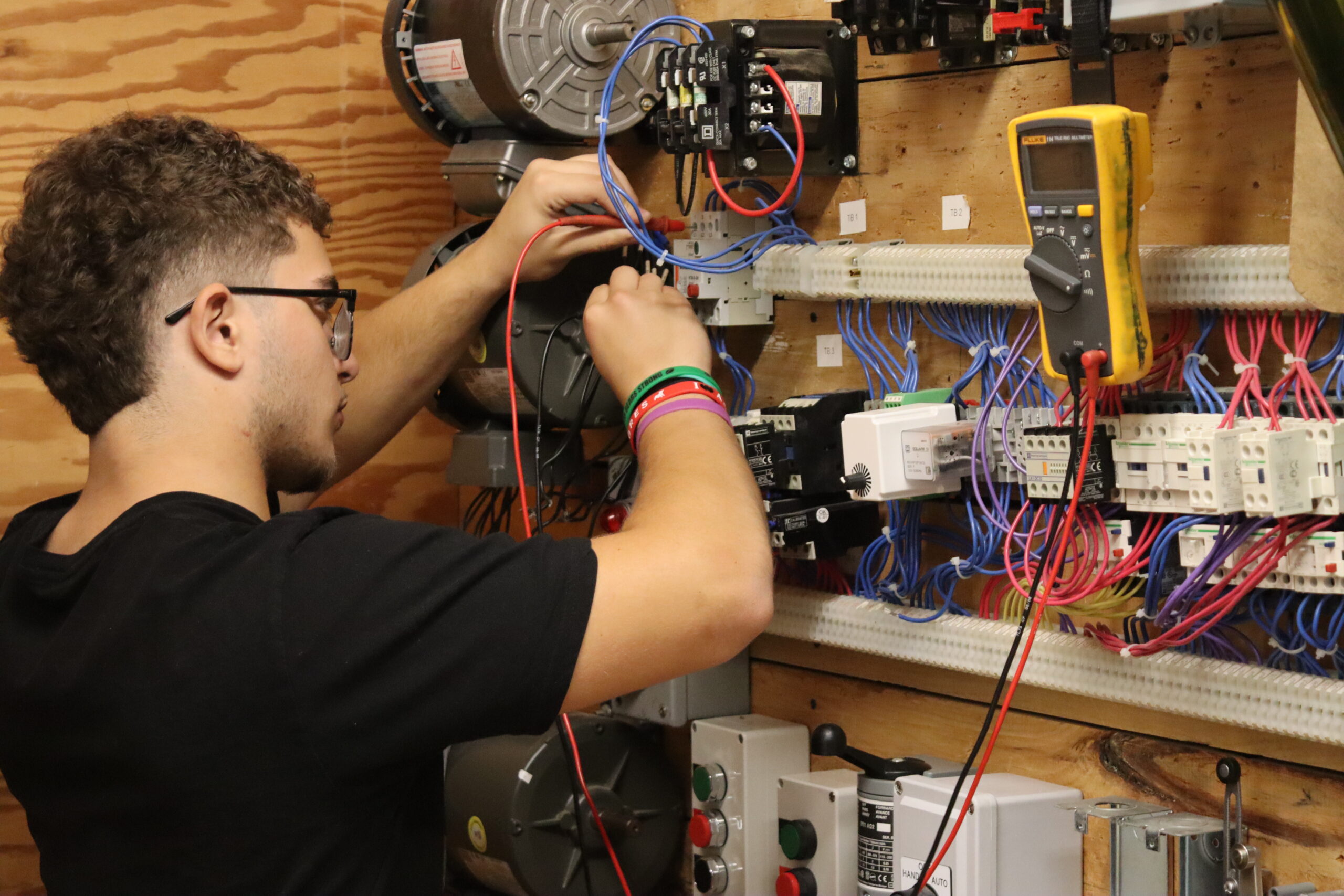CVTE
Electrical
Jeff Wildrick, Academy A Administrator – Ext. 291
Course & Program of Studies
Statement of Purpose
Our Electrical Technology program empowers students from diverse backgrounds to succeed by combining mathematical skills with mechanical aptitude. To thrive in this field, students must possess strong mathematical and mechanical abilities, as well as a capacity for abstract thinking.
Our program offers hands-on learning experiences with industry-standard equipment and materials. Students develop essential skills in blueprint interpretation, mechanical drawing, and understanding industry theories and codes. This comprehensive approach prepares them for real-world challenges in the electrical field.
Join us and unlock your full potential in Electrical Technology!
Exploratory Program
The Freshman Electrical Exploratory Program provides an introduction to the fundamentals of electrical work. Students will learn to safely use basic electrical hand tools and build simple electrical circuits, such as a wooden desk lamp and various low-voltage bell systems.
Through hands-on projects and written assessments, students will develop a foundational understanding of electrical concepts and career opportunities within the electrical trade.

Freshman Program
The Freshman Electrical Shop course provides students with a strong foundation in electrical fundamentals. Through hands-on projects and theoretical instruction, students will learn to:
- Utilize Electrical Tools: Students will develop proficiency in using electrical hand tools safely and effectively.
- Apply Electrical Principles: Students will apply Ohm’s Law and other electrical principles to build series and parallel circuits.
- Complete Wiring Tasks: Students will gain experience in wiring bell systems and non-metallic sheath cable installations.
- Interpret Electrical Drawings: Students will learn to read and interpret basic electrical drawings.
This course aligns with the 2023 Electrical Vocational Technical (VTE) Frameworks, preparing students for more advanced electrical work in their sophomore year.
Assessments include project completion, skill demonstrations, and daily evaluations of employability and performance.
Sophomore Program
The Sophomore Electrical Shop course provides students with hands-on experience in advanced electrical techniques. Building upon the foundational knowledge gained in their freshman year, students will:
- Master Advanced Wiring Techniques: Students will practice installing non-metallic sheathed cable, service cable, and various electrical boxes and fittings.
- Work with Electrical Service Equipment: Students will gain experience with electrical service equipment and panel boards.
- Understand Heating and Generator Systems: Students will learn about the principles and applications of heating and generator systems.
- Adhere to Electrical Codes: Students will comply with the Massachusetts Electrical Code in all projects.
Through these practical experiences, students will be well-prepared to pursue an apprenticeship and ultimately become licensed electricians.
Assessments include project completion, skill demonstrations, and daily evaluations of employability and performance.

Sophomore Related Class 1
DC CIRCUITS/THEORY
The Electrical DC Theory course provides a comprehensive foundation in direct current (DC) electrical principles. Over a 90-day period, students will explore key concepts, including:
- Electron Flow: Understanding the movement of electrons in electrical circuits.
- Electrical Measurements: Reading ammeters and voltmeters to measure current and voltage.
- Voltage Drop: Calculating voltage loss in electrical circuits.
- Resistance: Understanding the concept of electrical resistance and its impact on circuit behavior.
- Electrical Power: Calculating power consumption in electrical circuits.
- Magnetism: Exploring the relationship between electricity and magnetism.
- Blueprint Reading: Interpreting electrical blueprints to understand circuit diagrams and wiring layouts.
By the end of the course, students will have a solid understanding of DC electrical theory, preparing them for practical applications in electrical installations and troubleshooting.
Sophomore Related Class 2
ELEC. TECH. MATH
The Electrical Technical Math course focuses on developing essential mathematical skills necessary for success in the electrical field. Over a 90-day period, students will practice solving problems involving:
- Algebra: Applying algebraic principles to electrical calculations.
- Percentages: Calculating percentages related to electrical quantities.
- Resistance: Determining the resistance of electrical wires and components.
- Fractions: Working with fractions to represent electrical quantities.
- Ruler Scales: Reading and interpreting measurement scales on rulers and other tools.
- Unit Measurements: Converting between different units of measurement used in electrical calculations.
By mastering these mathematical skills, students will be better equipped to tackle complex electrical calculations and design projects.
Junior Program
The Junior Electrical Technology course builds upon foundational skills, focusing on commercial electrical work and pipe bending. Students will:
- Master Conduit Bending: Develop proficiency in bending conduit for commercial and industrial applications.
- Understand Electrical Systems: Learn about different voltage and lighting systems.
- Utilize Electrical Tools and Equipment: Gain hands-on experience with industry-standard tools and equipment.
- Apply Electrical Codes: Adhere to the Massachusetts Electrical Code in all projects.
- Participate in Real-World Projects: Gain practical experience through in-school projects and potential co-op opportunities.
This course aligns with the 2023 Electrical Vocational Technical (VTE) Frameworks, preparing students for advanced electrical work in their senior year and future careers in the electrical trade.
Assessments include project completion, skill demonstrations, and daily evaluations of employability and performance.
In-School Placements
To further enhance practical learning, junior electrical students participate in real-world electrical projects throughout the school. Under the guidance of instructors, students work on tasks assigned through a work order system managed by the school’s Facilities Department. This hands-on experience complements classroom instruction and prepares students for future employment in the electrical trade.

Junior Related 1
AC/DC THEORY & CIR’S
The AC/DC Theory & Equipment course provides a comprehensive understanding of both direct current (DC) and alternating current (AC) electrical principles. Over a 90-day period, students will explore key concepts, including:
- Magnetism and Electromagnetism: Understanding the relationship between electricity and magnetism.
- DC Generators and Motors: Learning about the principles of operation and applications of DC generators and motors.
- AC Fundamentals: Gaining an introductory understanding of alternating current, including its generation and characteristics.
- Electrical Safety: Adhering to OSHA safety standards for the construction industry.
By the end of the course, students will have a solid foundation in AC/DC electrical theory, preparing them for advanced electrical work and troubleshooting.
Junior Related 2
Junior Applied Technical Math I for Electrical
The Electrical Technical Math course focuses on developing essential mathematical skills necessary for success in the electrical field. Over a 90-day period, students will practice solving problems involving:
- Algebra: Applying algebraic principles to electrical calculations.
- Percentages and Efficiency: Calculating percentages and efficiency ratings.
- Ratios, Proportions, and Resistance: Using ratios, proportions, and Ohm’s Law to solve electrical problems.
- Surface Measurement: Calculating surface areas of various shapes.
- Wire Sizing: Determining appropriate wire sizes for electrical circuits.
- Trigonometry: Applying trigonometric functions to solve electrical problems involving angles and distances.
By mastering these mathematical skills, students will be well-prepared to tackle complex electrical calculations and design projects.
Senior Program
The Senior Electrical Technology Shop: Motor Control Lab provides a comprehensive introduction to industrial motor control systems. Over a 90-day period, students will:
- Master Basic Motor Controls: Learn to wire and troubleshoot basic motor starters and contactors.
- Utilize Input Devices: Gain experience with input devices such as pushbuttons, limit switches, and selector switches.
- Understand PLC Programming: Learn to design and program electrical ladder diagrams using PLC software.
- Apply Electrical Codes: Adhere to the Massachusetts Electrical Code in all projects.
By the end of the course, students will have a solid foundation in industrial motor control systems, preparing them for advanced electrical work and future career opportunities.
Senior Off Campus Construction
Off-Campus Project Rotation
- Three-day rotating schedule for students
- Small groups of no more than seven students per instructor
- Approximately four hours of on-site work per day
Safety Protocols and Training
- Adherence to OSHA standards and safety regulations
- Pre-job site safety review and ongoing safety discussions
- Emphasis on lock-out-tag-out procedures
Project Scope and Responsibilities
- Permitting and Planning:
- Obtaining necessary permits and approvals
- Reviewing blueprints and specifications
- Developing project timelines and schedules
- Material Acquisition:
- Creating material take-offs
- Ordering materials and equipment
- Managing inventory and logistics
- Construction and Installation:
- Rough wiring and conduit bending
- Device and fixture installation
- Cable pulling and termination
- Troubleshooting and problem-solving
- Final Inspection and Testing:
- Conducting final inspections and testing
- Documenting project completion
- Obtaining final inspections and approvals
Professional Development
- Exposure to real-world construction practices
- Development of teamwork and communication skills
- Understanding of industry standards and regulations
- Preparation for future careers in the electrical trade


Senior Related 1
Senior AC THEORY & EQUIPMENT
The AC Theory & Equipment course provides a comprehensive understanding of alternating current (AC) electrical principles. Over a 90-day period, students will explore key concepts, including:
- Single-Phase AC Circuits: Understanding the characteristics and behavior of single-phase AC circuits.
- Three-Phase AC Circuits: Learning about the principles of three-phase power systems and their applications.
- Transformers: Exploring the operation and applications of transformers, including voltage transformation and impedance matching.
- Single-Phase Motors: Understanding the types, characteristics, and applications of single-phase motors.
- Three-Phase Motors: Learning about the types, characteristics, and applications of three-phase motors.
By the end of the course, students will have a solid foundation in AC electrical theory, preparing them for advanced electrical work and troubleshooting in various industrial and commercial settings.
Senior Related 2
Senior Analytical Mathematics – Elective
The Analytical Mathematics course is a 60 minute per day, 90 day course that provides the development of math skills necessary for the understanding of electrical theory and application of electrical design and load calculations. At the end of the course students are expected to be proficient in the solution of calculations and the safe installation and sizing of electrical wiring and equipment based on the requirements of the National and Massachusetts Electrical Codes.
The Analytical Mathematics course provides a comprehensive understanding of the mathematical principles and electrical codes necessary for electrical design and installation. Over a 90-day period, students will:
- Master Electrical Calculations: Apply mathematical concepts to solve electrical problems, including circuit analysis, power calculations, and voltage drop calculations.
- Understand Electrical Codes: Gain knowledge of the National Electrical Code (NEC) and the Massachusetts Electrical Code (MEC), and apply their requirements to electrical installations.
- Learn Wire Sizing and Selection: Calculate wire sizes based on load requirements and code specifications.
- Practice Electrical Design: Design electrical systems, including residential, commercial, and industrial applications.
- Develop Problem-Solving Skills: Apply critical thinking and problem-solving techniques to electrical challenges.
By the end of the course, students will be well-prepared to design, install, and troubleshoot electrical systems, ensuring compliance with electrical codes and industry standards.
Certifications

Upon Graduation:
- OSHA 10-hour Construction Safety
- Electrical License Credit – 300 clock hours and 1800 hands-on hours
- 3M Fire Protection
- Hilti Powder Actuated Certification
Career Opportunities
- Residential Electrician
- Commercial Electrician
- Wind and Solar
- Power and Lighting
- Industrial Electrician
- Plant Electrician
- Maintenance Supervisor
- Motor Repair Technician
- Programmable Logic Controller Technician
- Electrical Inspector
- Low Voltage Electrician
- Cable TV Technician
- Fire Alarm Installation & Repair
- Security System Technician
- Electrical Contractor / Business owner
Post-Secondary Education
- Umass Dartmouth
- UMass Amherst
- Wentworth
- Lincoln Tech
- Naval Academy
- Bridgewater State



